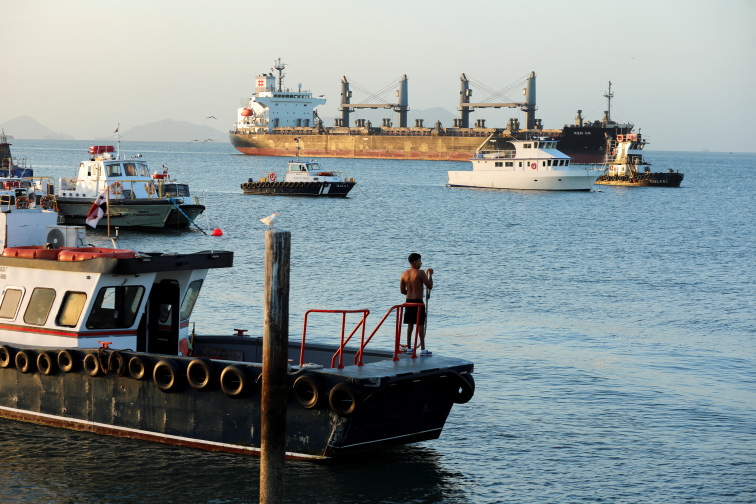(People News) - Panama's decision to withdraw from China’s Belt and Road Initiative (BRI) signals a major geopolitical shift and a significant setback for the Chinese Communist Party (CCP) in Latin America. U.S. Secretary of State Marco Rubio’s assertive diplomatic approach in the region has already borne fruit, dealing an immediate blow to Beijing’s influence. In addition to Panama announcing an audit of CK Hutchison Holdings’ port operations tied to the Panama Canal, CNN reported on February 2 that Panamanian President José Raúl Mulino declared Panama would not renew its BRI agreement with China, hinting at an early termination of the deal. In CCP parlance, Panama has effectively drawn a line in the sand with Beijing and pivoted back toward the U.S.
The Chinese Ministry of Foreign Affairs has yet to respond, and state media have remained silent on the matter. Analysts predict the CCP will soon express "strong opposition and firm dissatisfaction." Just two months ago, when the U.S. signaled it would re-examine the control of the Panama Canal, Beijing loudly insisted on respecting Panama’s sovereignty over the canal—an attempt to mask its broader strategy of controlling the canal via influence over Panama. The CCP’s state media distorted the canal’s history, trying to paint the U.S. as an imperialist power opposed to Panama’s independence. On December 23, Foreign Ministry spokesperson Mao Ning asserted that President Mulino emphasized Panama's full sovereignty over every inch of the canal and surrounding territory, declaring it immune from direct or indirect control by any major power. “China supports the Panamanian people’s just struggle to safeguard the sovereignty of the canal,” she said.
However, after Rubio assumed his post as Secretary of State, his first official visit starting February 1 focused on five Latin American countries, with a clear emphasis on the Panama Canal. He conveyed a direct message: if China’s influence over the canal isn't ended, the U.S. will take actions, including potential military measures. Under the mounting pressure of increased tariffs and frozen assets, Panama ultimately severed ties with the CCP.
CNN cited President Mulino stating that, the day after Rubio's visit, Panama sought new investment collaborations with the U.S. in infrastructure projects. “I believe this visit has opened the door to establishing new relationships... and aims to increase U.S. investment in Panama as much as possible,” Mulino said.
Rubio, writing in The Wall Street Journal, remarked, “The Chinese Communist Party has long used diplomatic and economic tools—such as its influence in the Panama Canal—to oppose the U.S., turning sovereign nations into client states.”
Carlos Claver-Carone, the U.S. State Department’s envoy to Latin America, emphasized that when former Panamanian President Juan Carlos Varela recognized China diplomatically in 2017, he “effectively opened the floodgates, handing over the canal zone’s strategic assets to the CCP.”
In his January 20 inauguration speech, President Donald Trump mentioned Panama six times, pledging that the U.S. would “take back the Panama Canal because Panama has not honored its commitments to the U.S. American vessels, including those of the Navy, have been overcharged for passage. Most importantly, the Chinese (CCP) are now operating the Panama Canal.”
Panama was the first Latin American country to join the Belt and Road Initiative. Its dramatic move to withdraw early from the BRI could make it the first Latin American country to exit the initiative altogether. Scholars argue that this reflects the diminishing effectiveness and appeal of the BRI, and it’s likely that other countries will follow suit, signaling the failure of the CCP’s attempt to use the BRI to unite Southern nations under its influence.
Zhuang Jiaying, an associate professor of political science at the National University of Singapore, suggested that CCP-operated enterprises involved in the Panama Canal might face nationalization by Panama or acquisition by U.S. companies in the near future.
Tseng Wei-feng, a research fellow at the Center for International Relations at National Chengchi University in Taipei, pointed out that Panama’s policy shift clearly aligns with the U.S.'s geopolitical influence. “The strong U.S. presence in Latin America and Panama’s commitments to the U.S. will significantly reduce the Chinese government’s (CCP’s) influence over both the Panamanian government and the Panama Canal,” Tseng told Voice of America. He added that beyond issuing diplomatic condemnations of American “hegemonism,” the CCP can only attempt to maintain influence in Panama through increased diplomatic engagement and soft power initiatives, such as cultural exchanges.
According to Radio Free Asia, a White House spokesperson stated that Xi Jinping is expected to speak with President Trump as early as this week to seek an agreement. Analysts suggest that Xi may bow to Trump’s pressure and make concessions on issues like the canal and tariffs. This marks the CCP’s second defeat to the U.S. after Trump’s imposition of the 10% tariff. Online commentators noted that more defeats for the CCP are likely on the horizon.










News magazine bootstrap themes!
I like this themes, fast loading and look profesional
Thank you Carlos!
You're welcome!
Please support me with give positive rating!
Yes Sure!